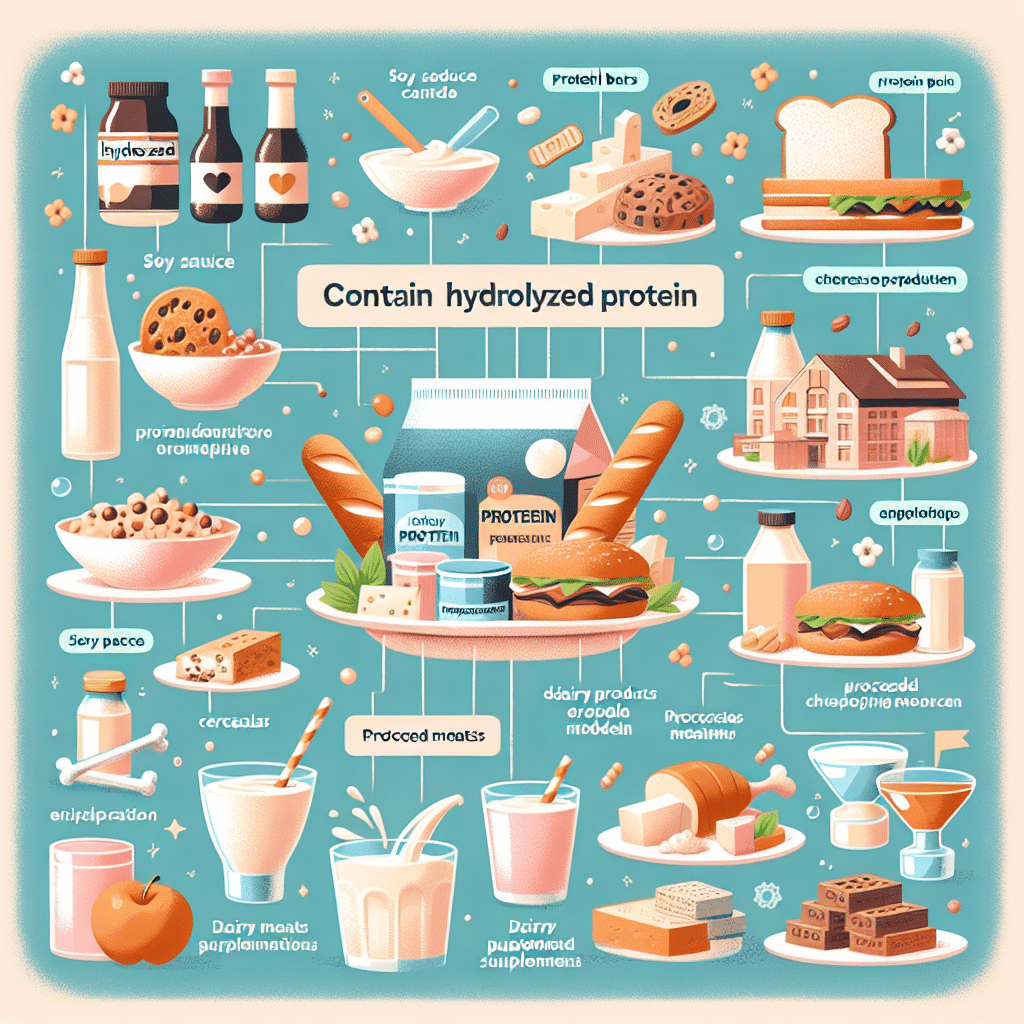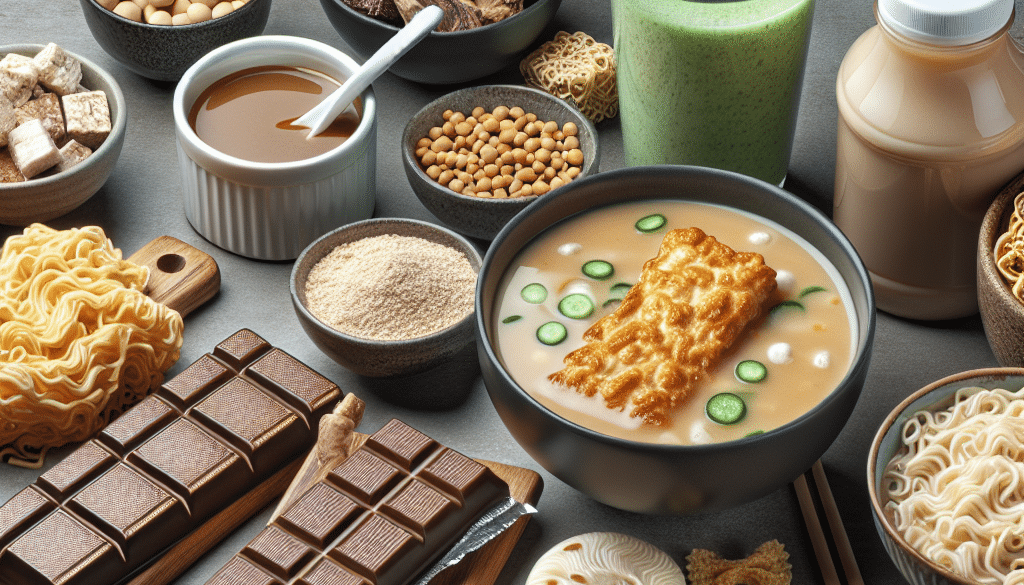What Foods Contain Hydrolyzed Protein?
-
Table of Contents
- Hydrolyzed Protein in Foods: A Comprehensive Guide
- Understanding Hydrolyzed Protein
- Foods Containing Hydrolyzed Protein
- Benefits of Hydrolyzed Protein in Foods
- Applications in the Food Industry
- Case Studies and Statistics
- Conclusion: Key Takeaways on Hydrolyzed Protein Foods
- Discover ETprotein’s High-Quality Protein Products
Hydrolyzed Protein in Foods: A Comprehensive Guide

Proteins are essential macronutrients that play a critical role in building, maintaining, and repairing tissues in the body. Hydrolyzed proteins, which are proteins that have been broken down into smaller peptides or amino acids, are becoming increasingly popular in various food products due to their enhanced digestibility and reduced allergenic potential. In this article, we will explore the foods that contain hydrolyzed protein, their benefits, and their applications in the food industry.
Understanding Hydrolyzed Protein
Before diving into the foods that contain hydrolyzed protein, it’s important to understand what hydrolyzed protein is and how it’s produced. Hydrolysis is a chemical process that uses water to break down protein molecules into smaller chains of amino acids. This process can be achieved through various methods, including enzymatic hydrolysis, acid hydrolysis, or heat and pressure. The resulting hydrolyzed protein is easier for the body to absorb and less likely to cause allergic reactions.
Foods Containing Hydrolyzed Protein
Hydrolyzed protein can be found in a wide range of food products. Here are some common examples:
- Infant Formula: Hydrolyzed protein is often used in infant formula to make it easier for babies to digest and to reduce the risk of milk allergies.
- Sports Nutrition Products: Many protein powders, bars, and shakes designed for athletes contain hydrolyzed protein to aid in quick muscle recovery.
- Processed Meats: Hydrolyzed vegetable protein (HVP) or hydrolyzed animal protein (HAP) can be added to processed meats to enhance flavor and texture.
- Seasonings and Flavor Enhancers: Hydrolyzed protein is used in seasonings, broths, and flavor enhancers to provide a savory taste known as umami.
- Dairy Products: Some dairy products, such as certain cheeses and yogurts, may contain hydrolyzed protein to improve digestibility.
- Medical and Special Dietary Foods: Hydrolyzed protein is used in medical nutrition products and foods for individuals with specific dietary needs.
Benefits of Hydrolyzed Protein in Foods
Hydrolyzed protein offers several benefits when included in food products:
- Improved Digestibility: The smaller peptides in hydrolyzed protein are easier for the body to absorb, making it an excellent option for those with digestive issues.
- Reduced Allergenicity: Hydrolysis can reduce the allergenic potential of proteins, which is particularly beneficial in infant formula and hypoallergenic foods.
- Enhanced Flavor: Hydrolyzed proteins can enhance the flavor profile of foods, contributing to a richer and more savory taste.
- Increased Solubility: Hydrolyzed proteins are more soluble, which is advantageous in beverages and liquid nutrition products.
Applications in the Food Industry
The food industry utilizes hydrolyzed protein in various applications:
- Flavoring: Hydrolyzed vegetable protein (HVP) is commonly used as a flavor enhancer in soups, sauces, and snacks.
- Functional Ingredients: Hydrolyzed protein can improve the texture and moisture retention in baked goods and processed meats.
- Nutritional Supplements: Hydrolyzed protein is a key ingredient in many nutritional supplements aimed at providing easily digestible protein.
Case Studies and Statistics
Several studies have highlighted the benefits of hydrolyzed protein in food products. For instance, research has shown that infants fed with hydrolyzed formula have a lower risk of developing allergies compared to those fed with non-hydrolyzed formula. Additionally, athletes consuming hydrolyzed protein supplements have reported faster recovery times and improved performance.
Statistics indicate that the market for hydrolyzed protein is growing, with a significant increase in demand for hydrolyzed plant proteins due to the rise in veganism and vegetarianism. The global hydrolyzed protein market is expected to continue expanding as consumers become more aware of its health benefits.
Conclusion: Key Takeaways on Hydrolyzed Protein Foods
In summary, hydrolyzed protein is a versatile ingredient found in a variety of food products, from infant formula to sports nutrition supplements. Its benefits include improved digestibility, reduced allergenicity, enhanced flavor, and increased solubility, making it a valuable addition to the food industry. As consumer demand for easily digestible and hypoallergenic protein sources grows, we can expect to see more foods containing hydrolyzed protein on the market.
Discover ETprotein’s High-Quality Protein Products
If you’re interested in incorporating hydrolyzed protein into your diet or product line, ETprotein offers a range of high-quality protein products. Their selection includes organic rice protein, pea protein, and various seed proteins, all characterized by a neutral taste, non-GMO, and allergen-free attributes. With L-(+)-Ergothioneine purity over 98%, ETprotein caters to industries such as nutraceuticals, pharmaceuticals, cosmeceuticals, and food and beverage. Contact ETprotein to explore their offerings and find the perfect protein solution for your needs.
About ETprotein:
ETprotein, a reputable protein and L-(+)-Ergothioneine (EGT) Chinese factory manufacturer and supplier, is renowned for producing, stocking, exporting, and delivering the highest quality organic bulk vegan proteins and L-(+)-Ergothioneine. They include Organic rice protein, clear rice protein, pea protein, clear pea protein, watermelon seed protein, pumpkin seed protein, sunflower seed protein, mung bean protein, peanut protein, and L-(+)-Ergothioneine EGT Pharmaceutical grade, L-(+)-Ergothioneine EGT food grade, L-(+)-Ergothioneine EGT cosmetic grade, L-(+)-Ergothioneine EGT reference grade and L-(+)-Ergothioneine EGT standard. Their offerings, characterized by a neutral taste, non-GMO, allergen-free attributes, with L-(+)-Ergothioneine purity over 98%, 99%, cater to a diverse range of industries. They serve nutraceutical, pharmaceutical, cosmeceutical, veterinary, as well as food and beverage finished product distributors, traders, and manufacturers across Europe, USA, Canada, Australia, Thailand, Japan, Korea, Brazil, and Chile, among others.
ETprotein specialization includes exporting and delivering tailor-made protein powder and finished nutritional supplements. Their extensive product range covers sectors like Food and Beverage, Sports Nutrition, Weight Management, Dietary Supplements, Health and Wellness Products, and Infant Formula, ensuring comprehensive solutions to meet all your protein needs.
As a trusted company by leading global food and beverage brands and Fortune 500 companies, ETprotein reinforces China’s reputation in the global arena. For more information or to sample their products, please contact them and email sales(at)ETprotein.com today.












